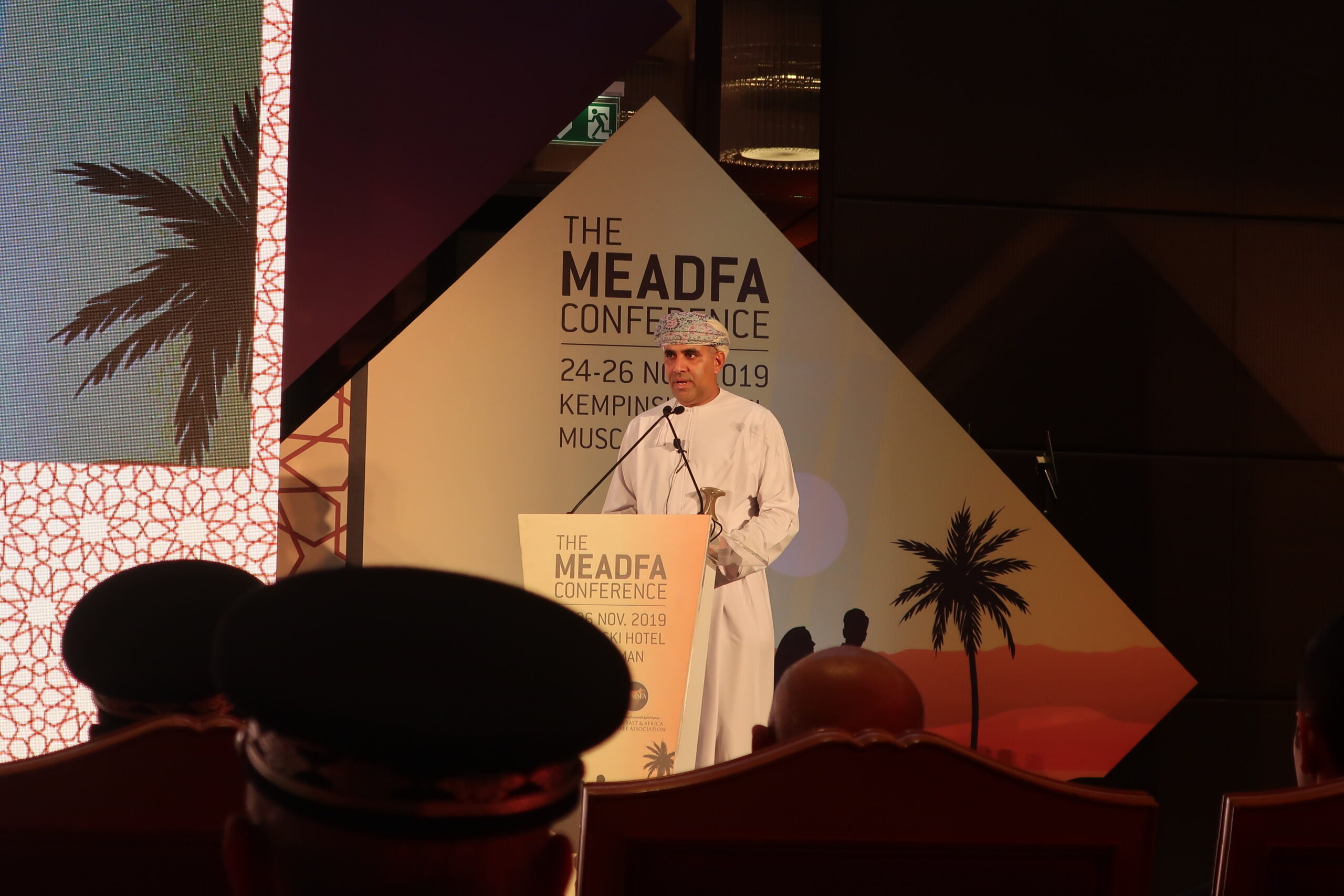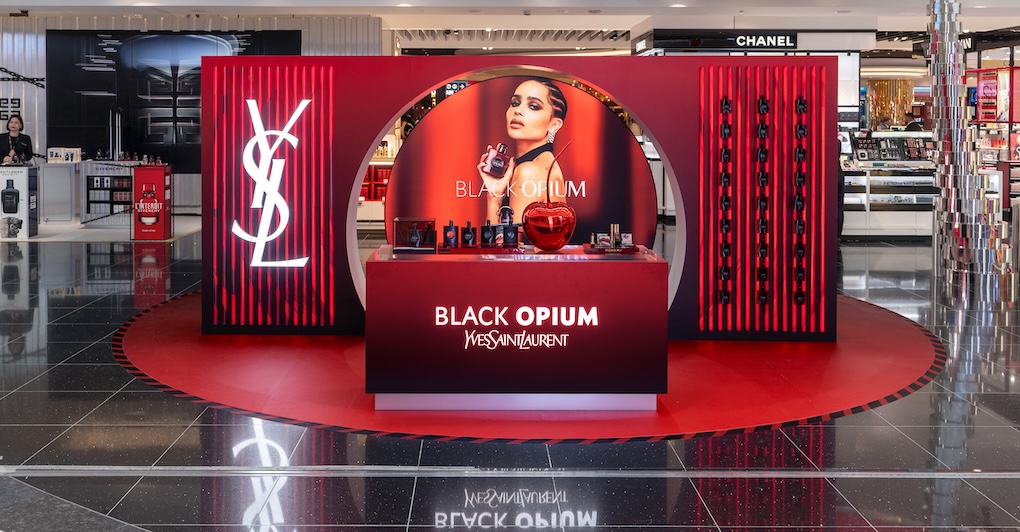OMAN. The Middle East & Africa Duty Free Association (MEADFA) hosts its annual conference this week in Muscat, with over 400 delegates registered.
The conference offers an opportunity not only to gather for business but also for first-time visitors to see this extraordinary country, with its great cultural and tourism attractions, from its vast mountain ranges to the Arabian Sea.
The event began on Sunday night with the Opening Cocktail, before two days of conference sessions. Hosted by Muscat Duty Free – there will also be senior Omani government and Oman Aviation Group representation at the event – it is organised by TFWA, with The Moodie Davitt Report President Dermot Davitt co-moderating alongside TFWA Managing Director John Rimmer.
We’ll bring you rolling coverage of the event, in partnership with Nestlé International Travel Retail and Dubai Duty Free over coming days, before we move onto the Dubai Duty Free Golf World Cup later in the week, one of the social highlights of the industry year.
TUESDAY 26 NOVEMBER
13.45 Finally, MEADFA President Haitham al Majali gave a passionate closing speech to the 434 delegates, where he thanked dignitaries, speakers, sponsors, the event hosts and the moderators.
“It is my pleasure to close and express gratitude to all those who made this event happen. We have reached the end of the 18th edition of the MEADFA Conference. Thanks to all delegates, who flew from all parts of the world. I hope you enjoyed the city of Muscat and found all sessions informative and thought-provoking,” he said.


13.10 In the closing keynote address, Professor Samer Baqer of Kuwait University’s Entrepreneurship & Innovation Unit offered insight on effective branding.
Baqer’s research into Generation Z found that duty free retailers need to do more to attract and appeal to this generation, despite 66.4% of those surveyed shopping in the duty free areas.
This group predominantly shopped in travel retail to make use of their waiting time or because of the price advantage in duty free, Baqer said.

Baqer’s research asked participants what they would like to see added to the duty free store. Interestingly, many participants said they wanted to see more baby products in the store, as well as more brands and fun music.
Influencers can shape the opinions of Generation Z and Baqer commented: “If you started to use influencers or celebrities from each culture, that would change the scene.”
12.40 After the first MEADFA Advocacy Working Group met yesterday, MEADFA Board Member Rita Chidiac and European Travel Retail Confederation (ETRC) Secretary General Julie Lassaigne updated delegates on the regulatory threats to the region.

Speaking about the first meeting of the Advocacy Group and how the association plans to step up its advocacy efforts in the future, Chidiac said: “We had a specific session to explain the context and reasons behind creating it and why it [the Advocacy Group] needs to act urgently. Our unique and valuable industry is under threat so we are stepping up and calling on all operating in the region to be part of this group.
She added that the group identified three key challenges for the region’s market: not enough understanding of what duty free is, excessive regulation and not utilising engagement or networking capacity.
Chidiac said that much of the regulation being introduced in the Middle East has already been seen in Europe, so it was important to engage with the ETRC.
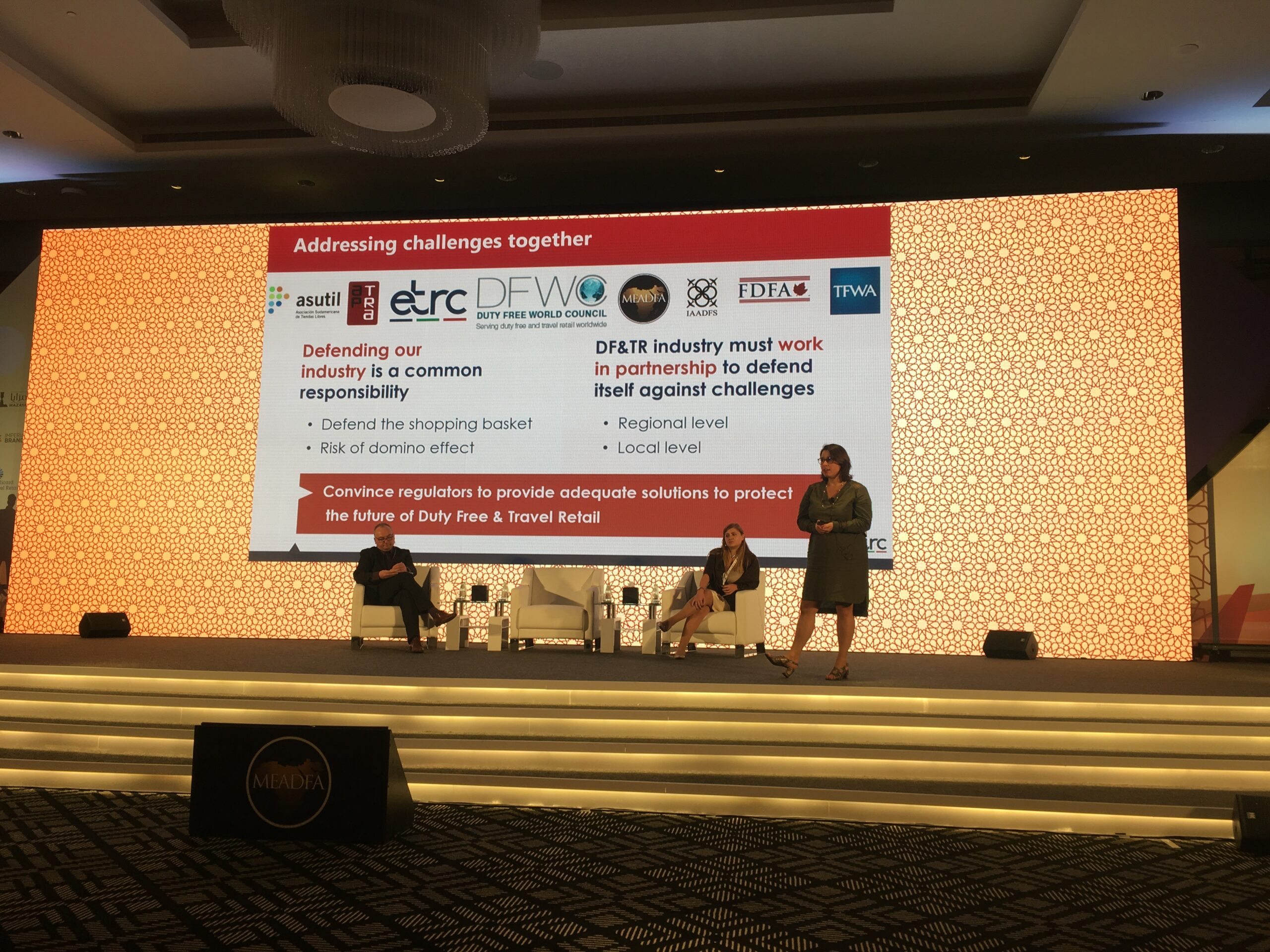
From the ETRC perspective, Lassaigne updated delegates on the illicit trade protocol, luggage restrictions and labelling.
Ahead of the second meeting of the parties (MOP2) regarding the illicit trade protocol in November 2020, Lassaigne said the Duty Free World Council (DFWC) would be kicking off a campaign offering stakeholders guidance and support in January.
On luggage, the ETRC is lobbying to amend EU legislation guaranteeing that shopping can be brought onboard, regardless of cabin allowances.
Moving on to labelling, Lassaigne warned: “That is an issue we need to solve, otherwise travel retail exclusives will be at risk from having to comply with multiple different international [labelling] regulations.”
She concluded: “You have to invest in your trade associations. There are so many challenges coming and we want to help you, but we need your support.”
12.00 The second half of the day opened with an in-depth focus on two rapidly developing travel retail locations: Muscat and Amman.
Muscat Duty Free General Manager Rob Marriott spoke from the perspective of the host city for this year’s MEADFA Conference and the “state-of-the-art” facility with three times as much retail space, with the number of retail units doubling to 22.

Delegates were then updated on the commercial offer in Amman, the first updates at the airport since the new terminal opened in 2013, by Airport International Group Chief Commercial Officer Deema Anani.
January saw Dufry open a new 635sq m arrivals store at Amman Queen Alia International Airport, which more than doubled the store size, improved tobacco visibility, enhanced alcohol positioning and introduced new perfumes & cosmetics brands, she said.

In departures, a new 2,520sq m store has also been introduced by Dufry at the airport. The introduction of a single walkway has helped to make the renovated store +12% bigger in size than the store it has replaced.
Both Marriott and Anani then took part in a discussion, which touched on Sense of Place and catering to a wide audience.
Marriott described Sense of Place as “something you can’t turn away from”. He added: “Our commercial buyer has worked really hard to get lots of local products. There is lots we are famous for in Oman, which we have maximised now.”
Anani said one of the challenges in Amman involved catering to passengers flying on low-cost carriers, as much as luxury consumers. “These are not people who simply will not buy, the question is whether we offer something for these individual tourists that can cater to their needs,” she said.
10.30 As African travel demand is expected to soar in the coming years, a session was dedicated to how travellers from this vast and diverse continent perceive travel retail.
Dufry Africa CEO Isabel Zarza offered a retailer’s perspective on the continent. She opened by saying that we currently see Africa as a whole, rather than a collection of diverse markets because the continent currently makes such a small contribution to global travel retail sales.
However, Africa’s demographic dividend holds huge potential for economic growth, as shown by the fact it was the fastest-growing region for aviation traffic in 2018.

In order to continue facilitating traffic growth in the region, there will need to better connectivity and a more open visa policy across Africa, Zarza argued.
She said the Single African Air Transport Market project, which is designed to create a single aviation market in Africa by 2063, will help solve these challenges, as well as boost trade and tourism throughout the continent.
Zarza closed her presentation with a well-received rallying call for the MEADFA Conference to be held in Africa. “If we really want to be inclusive of Africa in this conference, I officially request the next MEADFSA meeting be in Africa,” she said.
In a Q&A session after her presentation, Zarza acknowledged recent remarks by Dufry CEO Julián Díaz, where he said that Africa is one of the retailer’s highest growing areas. She added that African revenue for Dufry was seeing double-digit growth this year, putting it ahead of even the impressive traffic growth across Africa.

M1nd-set then presented highlights from a new study commissioned by TFWA that explores traveller behaviour across key African nationalities. Delegates heard from m1nd-set Owner & CEO Peter Mohn and Project & Business Development Manager Anna Marchesini.
They benchmarked their study of African passengers against Chinese shoppers in African airports. For example they found that 47% of African travellers visit the duty free store, in comparison to 56% of Chinese, and 53% of Africans that visit the store make a purchase, in comparison to 88% of Chinese. This means 25% of African airport visitors become duty free buyers in comparison to 49% of Chinese.
They found that 64% of African consumers decide to purchase a specific product while at the duty free shop. “It is important to not only give them a reason to browse the shop, but in-store elements are very important for the decision making,” Marchesini said.
In comparison to Chinese consumers in African airports, African travellers are less likely to compare prices (61% compared to 85%) and less likely to purchase duty free exclusives (46% compared to 65%). They are also less likely to interact with sales staff (61% compared to 84%), but Mohn emphasised that this level is still very high compared to the global average and staff have a strong influence on purchase decisions.
For African travellers that didn’t shop at duty free, the main purchase barriers cited by those interviewed were prices being too high (41%), no promotions motivating purchase (38%) wanting to compare prices (38%).
Mohn concluded by saying the primary takeaway from the research is that companies should invest in developing staff because of the significant impact they can have on driving purchases.
9.45 The changing consumer was also the focus of the second presentation of the day, which saw brand owners debate how to appeal to this changing consumer.
First of all, Butlers Chocolates Director of Sales Karl Marnane looked at how sustainability has become mainstream. Customers in the Middle East are “highly receptive” to purchasing brands associated with sustainability, he added.

Opportunities now exist for brands to align innovation with sustainable and ethical values. Consumers want it, retailers want it, it fuels innovation, it helps develop new markets, it saves money and it inspires and engages people, Marnane said.
At Butlers Chocolates, the company uses sustainably sourced cocoa through Cocoa Horizons, has 14% of its power provided by solar panels and recyclable packaging, he told delegates.
Marnane concluded: “The future is important to us and we are all going to play our part in nurturing and safeguarding it.”
Tito’s Handmade Vodka Managing Director International John McDonnell opened by saying that brands needed to apply a ‘high touch’ in the face of ‘high tech’.
Giving examples of companies embracing ‘high touch’, McDonnell talked about an experiential element being introduced by Crate & Barrel, Oman Arab Bank offering cinema vouchers and sampling in duty free outlets.

Millennials (those born 1980-1994) and the iGen (those born 1995-2012) are mainly focussed on digital convenience, social responsibility and sustainability, he added.
Addressing digital convenience, McDonnell called for a global duty free app in the same mould as Drizly in the US.
To have a strong CSR message, Tito’s supports rescue dogs, McDonnell said. While from a sustainability perspective, the vodka brand has introduced one of the largest privately owned solar farms in Texas.
In a Q&A session afterwards, Marnane said that most brands in travel retail have a strong sustainability message, but they don’t necessarily communicate this enough with consumers. He added this is something he would like to see trade bodies lead the way on.
9.00 The final day of MEADFA began with a focus on digital, as social media strategist Andrew Davis delivered an energising presentation on how companies can better connect with the digital native generation.
Davis argued that both the fact that the average human attention span has dropped 33% since the turn of the century and the advent of social media have changed the way consumers think.
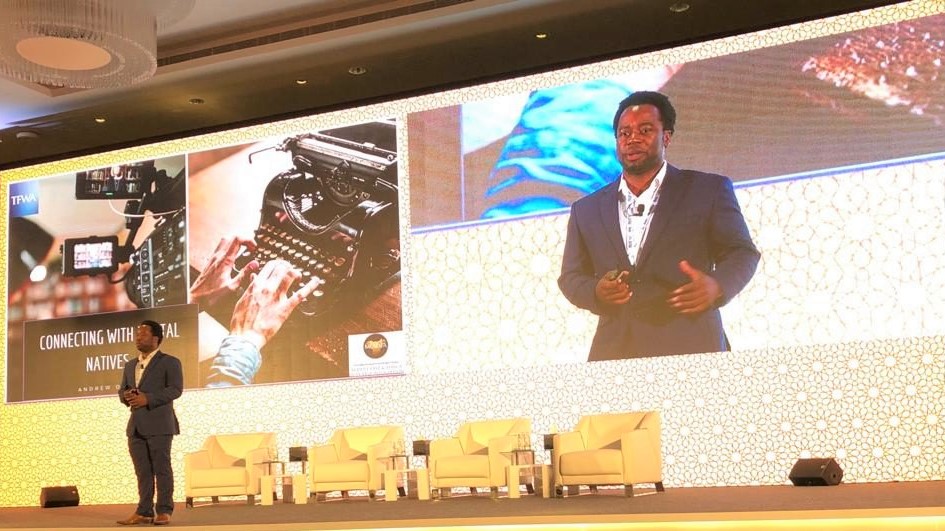
The customer journey has changed from the funnel model that traditionally turns eyeballs into buyers into something a lot more complicated. This needs to take account of social media posts, recommendations from friends and other factors defined by mobile phones, Davis said.
Davis focused specifically on the emergence of TikTok and Instagram stories in the Middle East in recent years as evidence that retailers need to tell stories on these platforms.
Davis concluded with nine objectives for social media content: sales cycle, campaign awareness, building brand credibility, building a community, research, thought leadership, footfall, reaching different audiences and increasing website traffic. “Social media is a game we are playing [and] these are the rules,” he said.
MONDAY 25 NOVEMBER
20.00 Muscat Duty Free tonight hosted a magnificent MEADFA Gala Dinner poolside at the Kempinski Hotel, with an array of wonderful dining and entertainment, and the rich and welcoming Omani hospitality at its heart.







12.40 The opening day of the conference concluded with a session dedicated to food & beverage (F&B) operations.
Dubai Airports Vice President Commercial Eugene Barry opened his presentation on a musical note by referencing Bob Dylan and saying, ‘The times they are a-changing’ as airport food becomes more progressive.
He said airports can differentiate themselves from other markets by offering specialised experiences that are meaningful and memorable. He cited the Asian Street Kitchen and Daily DXB recently introduced at Dubai International (DXB) as positive examples of this.

Barry argued that outlets that blur the lines between retail and F&B offer cross-category sales potential. “Integration is an interesting development. Singular concessions, which represent highly successful consumer brands, are starting to cross over into lifestyle, leisure, entertainment and personalisation at airports. I think it’s one of the most challenging and exciting developments for planners to start thinking about; it doesn’t just increase the revenue potential, but it can fully express the pulling power of a concept that has been created for your airport,” he said.
Continuing on the musical theme, Barry said, ‘Don’t stop thinking about tomorrow’, as airports have a responsibility to anticipate changing consumer behaviour and continue enabling business growth.
Barry said Dubai Airports was achieving this by harnessing Marketplace DXB – a pick-up or delivery service, which extends business opportunities across the airport and capitalises on real-time sales opportunities inside the airport.
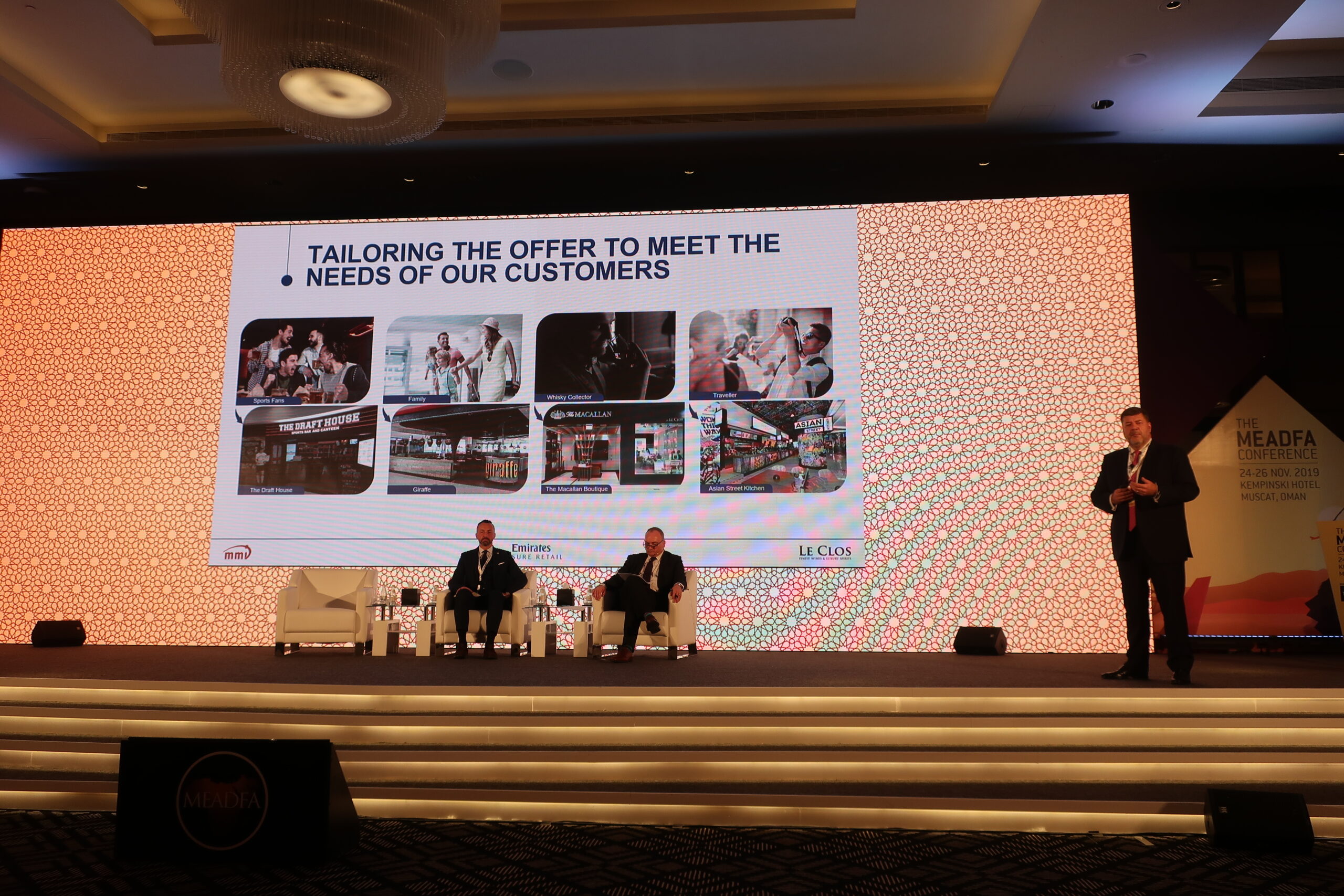
Sticking with the idea of change, Emirates Leisure Retail & MMI Group CEO Andrew Day looked at the way airport F&B is changing to keep up with changing consumer demand. For example, consumers want something more Instagram friendly, he argued.
Day said the three consumer demands that need to be integrated into airport F&B are: experiential dining, hyper-personalisation and CSR.
From an experiential side, Emirates Leisure Retail has introduced entertainment in the Asian Street Kitchen at DXB, offers tasting experiences in its Macallan boutique and sells smoking burgers ideal for social media posts in Jack’s Bar & Grill.
Hyper-personalisation, meanwhile, comes from bottle engravings and customisable art in coffee.
Finally, CSR is represented in Emirates Leisure Retail’s offer at DXB through re-usable cups in Costa Coffee and Beyond Burger offering vegan, ethically-sourced burgers.

What can traditional retail learn from these trends? Day said: “We need to get the basic experience right. We then need to get the functional transactional elements brilliant. Most of all, we should work incredibly hard on the experience.”
Day cited the introduction of a microbrewery in Munich Airport as a positive example of this.
12.00 One of the Middle East’s longest-serving airline executives and former CEO of Royal Jordanian, Gulf Air and SaudiGulf Airlines, Samer Majali, gave delegates the airline perspective.
Majali argued that airlines in the Middle East are currently operating in a very challenging environment as a result of external competition from larger carriers and state support being much more difficult to achieve. “Growth will continue, but at a slower pace,” he added.

That said, the Middle East is fraught with challenges for duty free retailers, as well as airlines, in the wake of airline restrictions in carry-on purchases often negatively impacting the region’s duty free operators. For that reason, it was refreshing to hear Majali call for airlines and retailers to work alongside each other, rather than compete with each other. He said that there was an opportunity for the two to work alongside each other for mutual benefit by utilising the power of the internet and inflight satellite communication.
The way ahead, he continued, would see carriers present the entire product range of the destination shop for inbound flights and explore the prospect of delivery to the passenger at their destination address on outbound flights.
In a Q&A session at the end of his presentation, Majali was asked about the potential for African carriers and the African aviation market. He said African carriers were currently 10-15 years behind. “Africa will have its day and a lot of emerging African carriers are doing a great job. Much like the Middle East and Far East have had their time, the next is Africa. They are starting off from a far lower base, so the potential is huge,” he told delegates
10.45 Dubai Duty Free Chief Operating Officer Ramesh Cidambi gave his thoughts on the issues currently shaping the duty free industry business in Dubai and beyond. His assessment of the climate was “cloudy with a chance of sunshine”.
The retailer hit a new sales high in 2018, breaking the US$2 billion barrier for the first time, but is not resting up in what is currently a challenging climate. Cidambi reported on new store openings, including a full refurbishment of Concourse C, the relocation of Salvatore Ferragamo and the opening of new Gucci and Chanel shops in Concourse B.
Cidambi added that the strengthening dollar would cause challenges and that China’s Real Activity is slowing rapidly. “We have never been exposed to one demographic as we have been to China,” he added.
Furthermore, increasingly strict tobacco regulations “damage the tobacco business and that impacts our business,” Cidambi said.
Despite these obstacles, Dubai Duty Free benefitted from its close relationship with Dubai Airports. Cidambi commented: “We are very happy with our relationship. I say that because we have had insight since a very early stage of airport developments.”
Cidambi talked about the interesting addition of a Concierge Shopping Service for Dubai Duty Free. This will allow customers to order products from the Emirates lounge in Concourse B and have them delivered within 90 minutes. “Once we do this it is then easy to extend this model to other opportunities,” he said.
Several key destinations, including London Heathrow, have seen traffic to Dubai drop in 2019. This has meant sales to UK passengers in the first ten months of the year were -6.22% compared to 2018 for Dubai Duty Free and down by US$4.8 million.
Dubai Duty Free has been able to overcome this drop in traffic by vastly improving its sales to Chinese passengers. The decline in sales to UK passengers has been more than accounted for by a +4.68% rise in sales to Chinese passengers, meaning a rise of US$11.09 million. As well as this, sales using UnionPay or AliPay were up +31.43% in the first ten months of 2019 and are now the third biggest payment option in Dubai Duty Free.
As a result, Cidambi said the retailer is anticipating a strong end of the year and still projecting its sales will pass US$2 billion for the second year in a row.

10.15 Before joining Aer Rianta International (ARI) as CEO in July 2018, Ray Hernan had been Chief Executive of Irish domestic retailer Arnotts. In a compelling and well-received presentation, Hernan addressed a diverse range of topics and compared the duty free channel to the domestic retail market.

Hernon spoke perhaps most insightfully on the current concession model in travel retail. He said he was “taken aback” to discover that five-year contracts are the norm in the airport retail environment.
He said: “As well as big concession fees, we are faced with MAGs. That means the whole risk is on retailers, which I believe is going to have to change. The way we do that is by working in partnership with brands, airports and others in the industry.”
Hernan emphasised that he would like to see aviation industry stakeholders work closer together for mutual benefit. “How we break that mould and get access to data is a critical way that we will be successful,” he added.
Airlines are a key part of improved data sharing and Hernan reiterated an argument heard at The Trinity Forum in Qatar, which is that the Trinity should become a Quaternity to account for airlines as well. “It would be fantastic if we could get access to airline data, but it will come at a price,” he said.

In a Q&A session with The Moodie Davitt Report President Dermot Davitt, Hernan said the ideal commercial relationship would see airports treat stores as an extension of the airport, rather than simply as rentable spaces. He added that he thought joint ventures between airports and retailers would be a key commercial model of the future.
9.30 Delegates will have seen the bright outlook for the aviation industry in Oman when arriving in the country, with the stunning new Muscat International Airport speaking for itself. Oman Airports CEO Sheikh Aimen Ahemd Al Hosni looked at how both the new airport and the growth of flag carrier Oman Airways were merely a by-product of the country’s continuing aviation growth.
Much like other countries in the Middle East, the national airline, airport operator and aviation services are closely connected in Oman through the Oman Aviation Group. Speaking about the benefits of this model, Al Hosni said: “Through the destination airline, we can get more tourists.”
Indeed, Oman Airports is hoping Muscat International Airport will join other airports in Qatar and the UAE as one of the region’s leading hubs. This is with the view of the aviation sector’s contribution to GDP more than quadrupling to 890 million OMR (US$2.31 billion) by 2030.
Al Hosni said this can be achieved thanks to the long-range, narrow-body aircraft operated by Oman Airways that can reach China with greater ease. To stimulate this growth, three new airports (Salalah, Muscat and Duqm) have opened in a three-year period. Furthermore, the new Muscat Airport is six times bigger than the airport it has replaced, and will ultimately boost the country’s airport capacity to 48 million passengers per year.
The Indian Subcontinent (ISC) is the largest regional segment for passengers passing through airports in Oman, Al Hosni said. Interestingly, despite this demographic’s lower-than-average wallet size, their propensity to spend is higher. “If you know your passengers, you will know what to offer them. This is what our duty free company and commercial team are doing,” he added.
Citing research from Airports Council International (ACI), which shows that retail concessions generate more than half of non-aeronautical revenue for airports in the Middle East, Al Hosni talked about the importance of retail in Oman’s burgeoning aviation scene.

Airport retail revenues are under threat from e-commerce and developing technology, Al Hosni added. “We would like to see how in the future we can invest in a better experience for our customers,” he said.
To compensate for this threat, Oman Airports is looking at how to create full digital retail engagement and using sophisticated technology to maximise resource utilisation.

Al Hosni concluded by saying that Oman Airports felt it could also benefit from delivering high customer satisfaction through airports that have a strong Sense of Place, while delivering Omani hospitality and smart technology.
9.05 MEADFA President Haitham Al Majali gave his assessment of the health of the travel retail market across the Middle East and Africa in his welcome address.
He opened by saying: “Oman is one of those countries that truly makes you feel at home when you arrive. The friendliness, kind atmosphere and generous culture all make one feel like they are in a place where they belong.”
Al Majali gave figures from Generation Research, which showed that in the first six months of 2019, sales in the Middle East travel retail market were +1.5% and Africa was +3.9% compared to 2018. “[That is] encouraging and I look forward to our session dedicated to African travel retail,” he added.
Oman Aviation Services CEO Dr Khalfan Said Al Shueili then gave his own welcome. “It gives me great honour to welcome you to this event in our beautiful country, Oman. We are very proud to host this event,” he said.
In the wake of challenges, such as the grounding of the Boeing 737 Max and carry-on luggage restrictions, Al Shelin said: “There remains great potential for further innovation. Nevertheless, we have to safeguard our environment.”
9.00 Conference moderators, The Moodie Davitt Report President Dermot Davitt and TFWA Managing Director John Rimmer, got the first day of the conference underway.
“Here in Oman, we are in one of the most dynamic markets for travel and travel retail,” Davitt said
Rimmer added: “We are proud to bring the conference here for the first time. We had a taste of the legendary Omani hospitality at the Opening Cocktail last night.”

SUNDAY 24 NOVEMBER
20.00 The Opening Cocktail kicks off MEADFA 2019, with a lovely open air event at the Kempinski Hotel, Muscat, featuring local music, dance and other entertainment.






14.00 The stunning Kempinski Hotel (below) is home to MEADFA 2019, where the finishing touches are being put to the stage and ballroom before the Cocktail tonight and main plenary sessions begin on Monday.
















